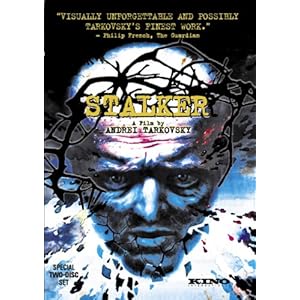
A year or two ago I played S.T.A.L.K.E.R.: Shadow of Chernobyl, a Ukrainian PC shooter about men called stalkers entering the dangerous zone around the famed nuclear power plant to seek out a room holding a machine that would grant their wish. I was vaguely aware that it was loosely based on a Russian novel called Roadside Picnic, which was also adapted into a film. This is that film, and while it obviously doesn't involve Chernobyl since it was made years before the disaster, the similarities are obvious. The difference is in how the story is portrayed by director Andrei Tarkovsky, who is considered by many one of the best ever. I could see why when I was watching the movie, which is one of the most starkly memorable and affecting I have seen in a long time.
There are only four characters that speak in the film. The first is the stalker, a man who is paid by those who have heard of him to lead them into the Zone; a mysterious, restricted area fraught with danger and housing the wish granting Room. The writer and the professor are his two clients in the movie, both wishing to see the Room but not divulging their reasons why. The last speaking character is the stalker's wife, who is only in the beginning and the end of the movie, and she provides a glimpse into the way his profession has damaged their lives, but admits she would rather be with him than not. They have a daughter born deformed because of his trips into the Zone, and she's an obvious consequence of what he does.
The most obvious thing anyone will notice about the movie is how it was shot. The areas outside and inside the Zone are shown in a brown-tinged black and white and full color respectively, providing a very harsh contrast that compliments the mysterious and unknowable nature of what they are entering. The whole thing is also done almost entirely in very long takes, some lasting for several minutes on end and few not going on at least a few seconds longer than they would in any normal scene, lending a very specific feel to the film. This style lends an oppressive atmosphere to the story, a certain existential dread that puts you in the mindset of the characters and makes you constantly on edge, waiting for something to happen while you wonder if there's really anything to what the stalker is so afraid of. I was physically drained by the end of the two and a half hours the movie takes to watch, and while it's not an experience I would like to replicate any time soon, it was certainly a unique one I appreciated the merits of.
I haven't talked much about the story itself, but while the actual plot content could probably be easily covered in about half the time the film takes, it's still an interesting one, a great example of how science fiction can look at real ideas in a new light. The discussions the characters have aren't just there to break up the monotony of scenes that seem to last for ages, but make you really consider the implications of what the Zone may or may not actually provide. The climactic scene is especially long, but extremely tense despite the static way in which it is shown, and the final scenes are perhaps the film's most mysterious and powerful. Recently I've seen several films that I said weren't for everyone, and I'm not sure I've ever meant it more than I do here. But while it was definitely taxing, I prefer that to being bored, and I found it to be extremely fascinating the whole time.
AAAAAGGGHHHH
16 years ago


































No comments:
Post a Comment